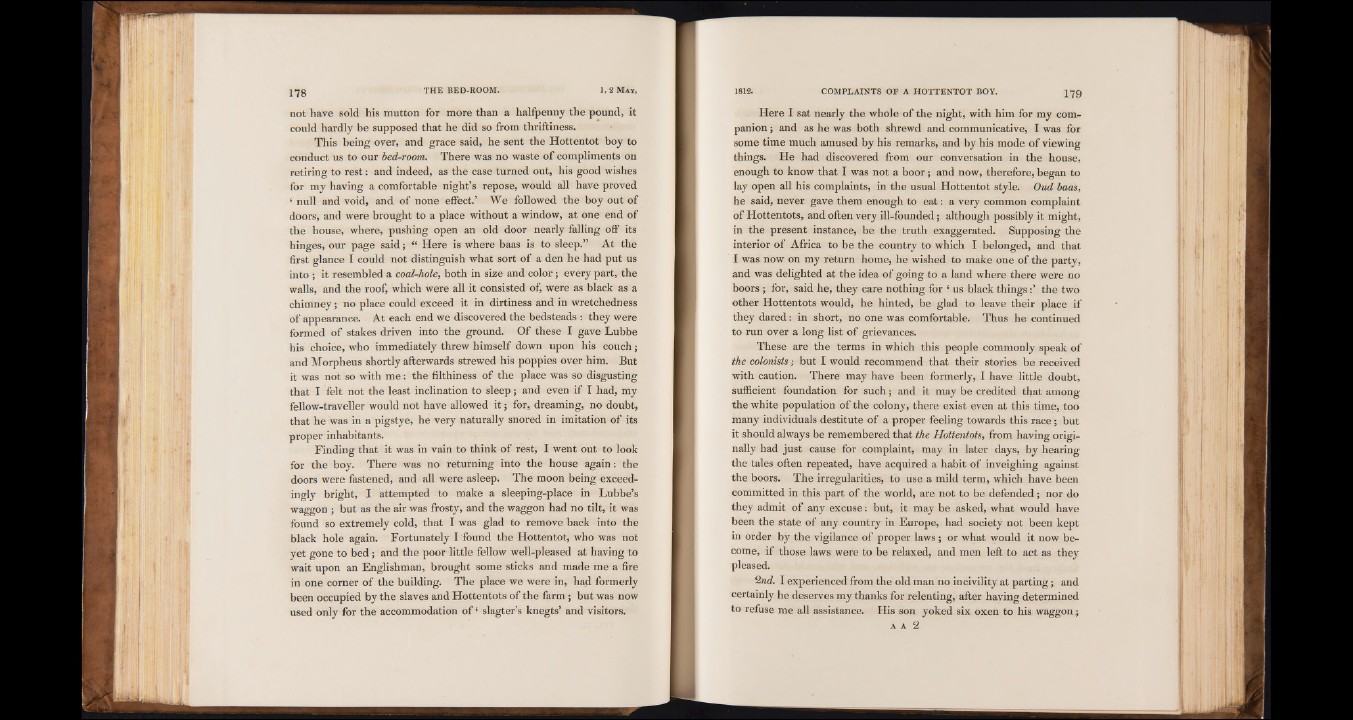
not have sold his mutton for more than a halfpenny the pound, it
could hardly he supposed that he did so from thriftiness.
This being over, and grace said, he sent the Hottentot boy to
conduct us to our bed-room. There was no waste of compliments on
retiring to rest: and indeed, as the case turned out, his good wishes
for my having a comfortable night’s repose, would all have proved
t null and void, and of none effect.’ We followed the boy out of
doors, and were brought to a place without a window, at one end of
the house, where, pushing open an old door nearly falling off its
hinges, our page said; “ Here is where baas is to sleep.” At the
first glance I could not distinguish what sort of a den he had put us
into ; it resembled a coal-hole, both in size and color; every part, the
walls, and the roof, which were all it consisted of, were as black as a
chimney; no place could exceed it in dirtiness and in wretchedness
of appearance. At each end we discovered the bedsteads : they were
formed of stakes driven into the ground. Of these I gave Lubbe
his choice, who immediately threw himself down upon his couch;
and Morpheus shortly afterwards strewed his poppies over him. But
it was not so with m e: the filthiness of the place was so disgusting
that I felt not the least inclination to sleep; and even if I had, my
fellow-traveller would not have allowed it ; for, dreaming, no doubt,
that he was in a pigstye, he very naturally snored in imitation of its
proper inhabitants.
Finding that it was in vain to think of rest; I went out to look
for the boy. There was no returning into the house again: the
doors were fastened, and all were asleep. The moon being exceedingly
bright, I attempted to make a sleeping-place in Lubbe’s
waggon ; but as the air was frosty, and the waggon had no tilt, it was
found so extremely cold, that I was glad to remove back into the
black hole again. Fortunately I found the Hottentot, who was not
yet gone to bed; and the poor little fellow well-pleased at having to
wait upon an Englishman, brought some sticks and made me a fire
in one comer of the building. The place we were in, had formerly
been occupied by the slaves and Hottentots of the farm ; but was now
used only for the accommodation of ‘ slagter’s knegts’ and visitors.
Here I sat nearly the whole of the night, with him for my companion
; and as he was both shrewd and communicative, I was for
some time much amused by his remarks, and by his mode of viewing
things. He had discovered from our conversation in the house,
enough to know that I was not a boor; and now, therefore, began to
lay open all his complaints, in the usual Hottentot style. Oud baas,
he said, never gave them enough to eat: a very common complaint
of Hottentots, and often very ill-founded; although possibly it might,
in the present instance, be the truth exaggerated. Supposing the
interior of Africa to be the country to which I belonged, and that
I was now on my return home, he wished to make one of the party,
and was delighted at the idea of going to a land where there were no
boors ; for, said he, they care nothing for ‘ us black things:’ the two
other Hottentots would, he hinted, be glad to leave their place if
they dared: in short, no one was comfortable. Thus he continued
to run over a long list of grievances.
These are the terms in which this people commonly speak of
the colonists; but I would recommend that their stories he received
with caution. There may have been formerly, I have little doubt,
sufficient foundation for such; and it may be credited that among
the white population of the colony, there exist even at this time, too
many individuals destitute of a proper feeling towards this race; but
it should always be remembered that the Hottentots, from having originally
had just cause for complaint, may in later days, by hearing
the tales often repeated, have acquired a habit of inveighing against
the boors. The irregularities, to use a mild term, which have been
committed in this part of the world, are not to be defended; nor do
they admit of any excuse: but, it may be asked, what would have
been the state of any country in Europe, had society not been kept
in order by the vigilance of proper laws; or what would it now become,
if those laws were to be relaxed, and men left to act as they
pleased.
‘2nd, I experienced from the old man no incivility at parting; and
certainly he deserves my thanks for relenting, after having determined
to refuse me all assistance. His son yoked six oxen to his waggon;
a a 2